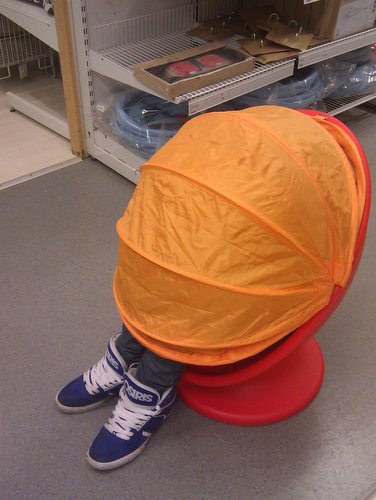I’m probably about to expose myself as a terribly unsophisticated person, but I actually like IKEA, the Swedish firm that is now the world’s largest furniture retailer. (IKEA stands for Ingvar Kamprad Elmtaryd Agunnaryd, by the way.)
Their branding is spot-on. The store is cheap, but it doesn’t feel cheap. There’s a consistency to IKEA – a clear narrative running through the store. And I really appreciate that they don’t sell by discounting. The price is the price: no need for spurious 50%-off offers.
We paid a visit on Friday evening with younger son (pictured above). We even had some food there: meatballs and gravy with lingenberry jam.
What can the wine trade learn from IKEA? The power of strong branding, allied to good product quality that exceeds the expectations of the consumer. The consistent message that runs through the store. Many retail outlets unwittingly scare or alienate the shopper, but IKEA takes away this fear and anxiety, making it easy for consumers to make their choices.
Most of all, the sign of a strong retailer is the ability to market without using massively discounted prices.
13 Comments on IKEA and wine



Not sure I understand this. Are you suggesting that wine makers should open their own shops and their sell their own wines, exclusively? Or are you equating IKEA with, say, Majestic or the WS?
Love the photo!
Also a guilty lover of illicit meatballs with lingonberries…
But on the subject of Ikea, yes there is some stuff that’s good quality and competitively priced, but there is rubbish as well. I suppose an Ikea in wine would force you to blend it and bottle it yourself – maybe Crushpad or whoever’s the closest match?
Or perhaps wine the IKEA way! Assembly instructions: Here’s a package of yeast, some grape must, oak chips and a demi-john. Mix, blend and leave for two weeks. £9.99
(Gives 50 liters of pure Swedish hooch)
Sorry Jamie, I’m Swede and I only see the assembly instructions in front of me when I hear the name of IKEA 😉
Best,
Niklas
Jamie
Nice note. I am sure that if they could, Dan Murphy’s (and related wine outlets) in Australia would serve meatballs as well. Most products now don’t even need the equivalent of an Allen key to “make it work” given the prevalence of scew-caps. Being able to distract the kids in a beverage outlet will remain a challenge.
Cheers from an all round consumer
Jim
Niklas, do you think you’d remove the closure with an Allen key?
Wow—why is everybody being so literal in their responses on this post? Branding has nothing to do with Allen keys. I get what he’s saying about the branding. I’m not hearing the human element, though, in how “IKEA takes away this fear and anxiety, making it easy for consumers to make their choices.” I’ve only ordered from IKEA catalogs and online, so I don’t know about their in-store customer service, but in the wine shop where I work two evenings/week, it’s the c/s that does this for the brand. In fact, our brand is about providing as much or as little help as someone wants (we are not on sales commissions, BTW) in a decidedly non-stuffy atmosphere. It’s the humans in the store who greet our shoppers, explain the layout, offer samples, and ease anxiety for newbies, in particular. We have about 500 wines in stock, with half of them under $20. The under-$20 wines have been sampled and approved being getting shelf-space, and they always exceed expectations!
Dig the trainers! Look new they do.
Osiris, not a brand i am familiar with?
Good one Alex. Of course an IKEA-wine would need an Allen key. And of course, when packing it up, they would have forgotten to put it in the package!
Sorry, not my intention to diminish IKEA in any matter. Jokes involving IKEA is just quite common in Sweden. Check the link. First pic says it all 😉
http://bit.ly/hXBuLo
Best,
Niklas
PS. Yes, I too shop at IKEA and eat the meatballs.
My comments were really about the branding – the consistency of the message, and the way it resonates with the offering. Not about opening an IKEA-style wine store, although that might be fun!
I suspect that I, too, might be naive but similarly believe that branding represents continuity and maintainence of a standard; offering the public consistently good, or unexpectedly better, quality is rewarded with sales and loyalty.
Regrettably too many brands are built on wishes and fancy advertising, flashy point of sale and presentation. I accept that quality is always a subjective matter but the very success of IKEA shows the old fashioned concept has a little life left.
Hmmm. I think there’s plenty of branding of wine already.
The result is formulaic swill, sold at a price point, less
the weekly special offers that get them off the shelves.
Anyone for a Critter Wine?
Give me a product that’s a reflection of the vineyard,
the weather for that season, the winemaker……………
Its too bad that most of their stuff is so crappy and disposable that it ends up in the landfill years before slightly more expensive stuff from elsewhere..